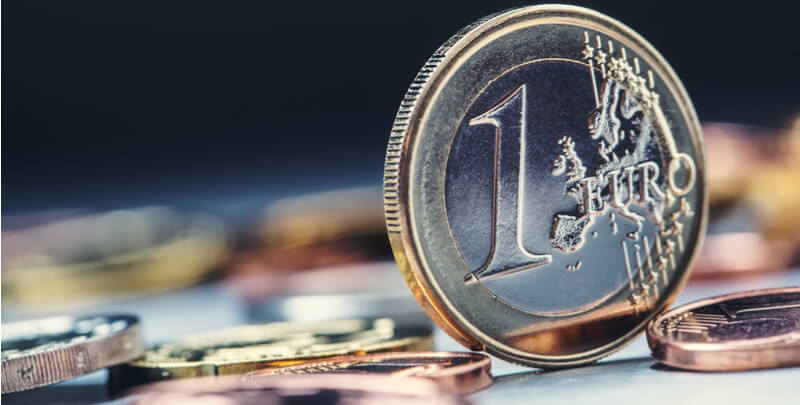ATMs In Cyprus: Credit Cards And Fees
Cyprus is still trying to shake the reputation of financial instability it’s had since the early 2010s. In reality, this Middle Eastern island nation has a...

Situated in the south of Turkey, Cyprus is geographically in Asia. Yet the small island country with a population just over a million people has been a member of the European Union since 2004. It’s also a tourism hub: not only does it boast a stunning coastline, but also fascinating archeological sites, dating from the New Stone Age to the Roman Empire. It’s main city is often referred to as the world’s last divided capital: one side officially belongs to the country of Cyprus whereas the northeastern part is its own self-proclaimed republic.
Through this guide, you’ll get a break down of Cyprus’ currency, where to find money, how to spend it, and a breakdown of the banks there.
The official currency of Cyprus has been the euro since it joined the Eurozone on January 1, 2008, alongside fellow island state Malta. Before that, people in Cyprus counted on the Cypriot Pound as their currency.
However, Northern Cyprus uses the Turkish Lira as its currency. Similarly to the Euro and the former Cypriot pound, the Lira is divided into 100 units called kuruş.
| Characteristics of the Euro | |
|---|---|
| Names and nicknames | Euro |
| Symbols and abbreviations | Written as € or EUR is the international 3-letter code on the currency exchange market |
| 1 EUR | One euro is divided into 100 cents, similar to the dollar. |
| EUR coins | Euro coins are available in denominations ranging from 1 cent to 2 euros. In Cyprus, it’s common to pay for smaller purchases with one and two euro coins. |
| EUR banknotes | Euro bills range from €5 to €500. They’re printed on pure cotton fiber, improving their durability and giving them a distinctive feel. |
Travelers to Cyprus can’t count on using any currency but the Euro - or Turkish Lira in Northern Cyprus - to pay for goods and services. Despite being a tourist hub, using any other currency is pretty uncommon.
However, international credit and debit cards are still widely accepted at major retailers. ATMs are also widely accessible, and foreign debit cards can often be used to withdraw cash. There’s also the possibility of exchanging cash at several locations, which we’ll detail for you later.
Foreign visitors to Cyprus can exchange their currency both at banks and currency exchanges.
The Bank of Cyprus, with locations in every province, is your best bet for exchanging your cash from home without forfeiting too much of it.
Often, exchange services, especially at airports and hotels, will try to woo customers by throwing out the enticing phrases “0 fees” or “No commission”. However, this is almost always too good to be true. Just do a quick search on Google or check an online currency converter, and you’ll see that your cash is worth a fair bit more than an exchange bureau or bank is promising you.
Banks and large global finance companies determine the mid-market rate through currency trades which happen all-day, every day. Do a quick Google search, and you’ll find out this rate, and subsequently what your money is actually worth. Banks and transfer exchange services often concoct their own, much poorer exchange rate for you and then pocket the difference. So even if it seems like a good deal, make sure to shop around and check rates on Google before agreeing to the exchange.
Sometimes it makes sense to convert from your home currency to euros before you head off on your travels. Other times, however, you can snag a better deal abroad. Through websites such as finder.com, you can compare and contrast the exchange rate of several services, both at home and in Cyprus.
Likely you’ll land at an airport in Cyprus, and see a few currency exchange bureaus at your disposal. Convenient they may be, but cost-effective they aren’t. Airports and hotels have captive markets, meaning they can charge higher prices due to the obvious lack of competition. Only ever exchange money here if you really need to, otherwise head to a proper currency exchange service with a more cost-effective rate. It’ll pay off big time.
If you’ve brought along cash with you from back home, make sure that those bills in your pocket are in good shape. In Cyprus, merchants will sometimes refuse to accept any sort of damaged banknotes to exchange. Ensure that whatever banknotes you have aren’t damaged or torn to be sure that they are accepted.
If you’re a frequent traveler, or if you just fancy having the option to hold your money in different currencies, consider getting a Wise Borderless account. They offer you 27 different currencies to hold money in, and you can even get local bank details for pounds, dollars, and most importantly euros. So you can send euros to Cyprus ahead of time, hassle-free. And they charge an upfront and transparent fee, so you don’t need to worry about getting ripped off by another unfair exchange rate.
And, if you’re heading to Cyprus a little later in the year, you’ll even be able to get a debit card you can use with your Borderless account. So you can spend money just like a local.
You can buy travellers cheques (or ‘checks’ in the US) at most banks, which will smack you with a fee of anywhere from 1-4%. Despite the higher cost, if you still want to purchase travellers cheques, it’s better to buy euro-specific cheques. That will make them more likely to be accepted at local businesses and without having to deal with the hassle of paying high conversion fees. Nowadays, however, it’s better to simply use cash or a debit or credit card if you can, which are far more likely to be accepted in Cyprus.
Major providers such as Mastercard and Visa are widely accepted at major restaurants, stores and hotels in Cyprus. Less commonly accepted are American Express, Cirrus, and Maestro. However, not all smaller shops and grocery stores - especially outside the well-worn tourist areas - are as keen on accepting cards. So it’s a wise idea to always carry some cash with you while you’re there.
The good news is that ATMs in Cyprus rarely charge on-site withdrawal fees like you find in many other countries.
On the flip side, if you make purchases with your card or withdraw from an ATM, you're likely to be offered Dynamic Currency Conversion (DCC). This means the card merchant or ATM will charge you in your home currency rather than in euros. It’s understandable that this might seem a bit more convenient, as you’re paying in the currency you’re familiar with. But be warned: you’ll pay a hefty price, sometimes four or more percent, just for that little bit extra convenience. With DCC, you’re letting the local ATM dictate the exchange rate they’ll use for your transaction. And this exchange rate isn’t going to be good for you, since you’re not their customer. So, if you see DCC, always decline, and pay in euros, where your own bank will give you a much better exchange rate - not to mention save you a bit of money in the long run.
Travellers are often guilty of forgetting to let their bank know that they’re heading abroad. Don’t make that mistake. Before you land in Cyprus, call your bank or card issuer to notify them you’re heading overseas. Otherwise, they could see your money being spent in Cyprus, think there’s suspicious activity taking place, and lock your card. Not fun at all.
ATMS are very common in Cyprus, even in smaller towns and villages. As long as you have your 4-digit pin for your ATM card, you can typically withdraw euros from your own account.
Still, keep an eye out for offers to be charged in your home currency rather than the local one. If you see the option, always select to be charged in euros to avoid steeper fees and poor exchange rates.
If you’re on the lookout for an ATM near you, VISA offers a global ATM locator website which will help you find ATMs throughout Cyprus.
There are several banks operating in Cyprus, many with international branches. If you aren’t sure if your home bank has a branch, it’s worth investigating if they may have a partner in Cyprus, which could help reduce your overall ATM fees.
Cyprus is a beautiful and popular destination for expats and holidaymakers alike. Make sure that your stay there doesn’t put you out of pocket, and you come home sun-tanned and smiling.
This publication is provided for general information purposes only and is not intended to cover every aspect of the topics with which it deals. It is not intended to amount to advice on which you should rely. You must obtain professional or specialist advice before taking, or refraining from, any action on the basis of the content in this publication. The information in this publication does not constitute legal, tax or other professional advice from TransferWise Limited or its affiliates. Prior results do not guarantee a similar outcome. We make no representations, warranties or guarantees, whether express or implied, that the content in the publication is accurate, complete or up to date.
*Please see terms of use and product availability for your region or visit Wise fees and pricing for the most up to date pricing and fee information.
This publication is provided for general information purposes and does not constitute legal, tax or other professional advice from Wise Payments Limited or its subsidiaries and its affiliates, and it is not intended as a substitute for obtaining advice from a financial advisor or any other professional.
We make no representations, warranties or guarantees, whether expressed or implied, that the content in the publication is accurate, complete or up to date.

Cyprus is still trying to shake the reputation of financial instability it’s had since the early 2010s. In reality, this Middle Eastern island nation has a...